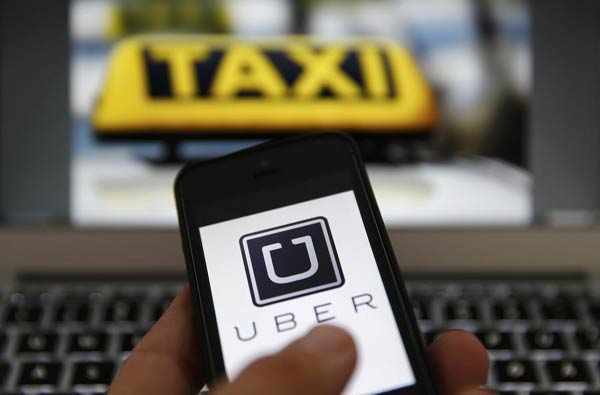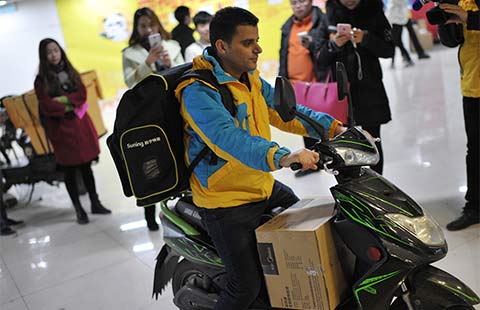Alipay, Uber ally to ease Chinese payment overseas
By Shi Jing (China Daily) Updated: 2016-02-02 07:26
 |
|
A file illustration picture shows the logo of car-sharing service app Uber on a smartphone next to the picture of an official German taxi sign in Frankfurt, September 15, 2014. [Photo/Agencies] |
Ride-hailing company Uber China and e-commerce giant Alibaba's financial arm Ant Financial Service Group jointly announced cooperation regarding online payment on Monday, allowing Chinese mainland Uber users to use the car-hailing services overseas and pay in renminbi.
Starting from Monday, the overseas payment function of Alibaba's payment tool Alipay was activated within Uber. Hong Kong, Macao and Taiwan will be the first places to roll out such services before Spring Festival, which falls on Feb 8 this year.
The connection among the three places, and the large number of mainland visitors coming every year for business or sightseeing purposes are the major reasons prompting the two companies' latest decision.
According to official statistics provided by the China National Tourism Administration, Hong Kong, Macao and Taiwan were the top 10 most popular tourist destinations among mainland tourists in 2015.
Eric Alexander, Uber's Asia head, said that the cooperation with Alipay on a global scale was aimed at enhancing mainland users' payment experiences when they travel overseas.
So far, more than 5,000 stores in Hong Kong, Macao and Taiwan are now connected to Alipay. An additional 50,000 stores in Asia, Europe and Australia accept Alipay payment.
Peng Yijie, president of Ant Financial's international business, said that Alipay has been providing transportation reservation services in some parts of the world. But the cooperation with Uber will win it increased recognition among a larger group of consumers.
Alipay was connected to Uber as early as 2014. But before Monday's cooperation, Chinese mainland users have to link their Uber account to renminbi-US dollar dual-currency credit cards and pay only in US dollars.
Financial services provider CLSA Asia-Pacific Markets said that 125 million mainland tourists traveled overseas in 2015. The number is expected to grow fast to reach 200 million by 2020.
Chen Jie, a procurement manager at a Shanghai-based multinational manufacturing company, traveled to the United States in January. Before her trip, she had to link her Uber account to a credit card so that she could use the service while in the US.
"Honestly it is not too much trouble to key in some information before the trip. But for consumers, it is always the easier, the better," she said.
- Bidding farewell to traditional IT resources in education
- Luxury auto market feels the sting of China's slowdown
- New head committed to Infiniti roadmap
- Backed by Tencent, startup puts prominent names behind wheel
- Alternative yardsticks show upbeat signs in Chinese market
- Xiaomi denies authorizing US handset sales
- World Bank loans finance Hebei clean heating system
- China's logistics sector continues to expand
















